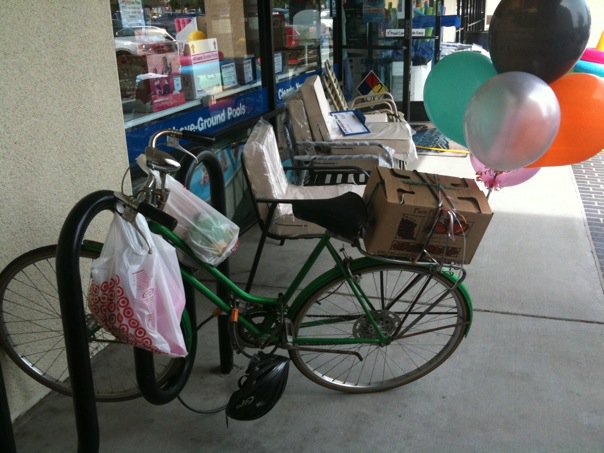Part of a continuing diary of how Corbyn's Hightower's family of five is surviving the Great Recession. In the first installment, "Dude, Where's Our Car?" Corbyn describes how the family was forced to sell their car in order to make the rent. Now, she describes their first week carfree.
Our first week without a car in suburbia tested our mettle. First there was the challenge of aquiring the supplies, cake, balloons, and gifts for a child's birthday before we were able to buy a bike trailer (note: bought five helium balloons; lost two to the mysteries of high-traffic bike maneuvers). The cake slid and arrived destroyed, but we were able to poke candles into the pile, and it tasted just as good.
The next trial came when my husband cycled four miles to take our son to swim class, and only discovered he'd forgotten the suit and towels after getting to the pool. Thankfully, he had left plenty of time for error. In the end, it was about sixteen miles all-told for that Saturday morning journey. This raises the question: are we going to just trade gas expenses for extra food expenses? Luckily, I have fat to spare. For once, my body's predilection towards saving fat for times of famine may actually come in handy.
 After a week of riding around on my ancient, barely-functioning Schwinn, I was glad that my workhorse, entry-price cruiser finally arrived and had been assembled at the bike store (at left). And just in time as the Schwinn finally broke beyond repair, and I was supposed to take the toddlers to an Easter party the next morning. The problem? The bike was delivered to the wrong location, ten miles away. I made my way there (bus system? Fail. Resorted to a painfully-expensive cab ride,) and rode home the ten hilly, high traffic ten miles in a downpour with high winds. Got some concerned looks, but arrived home with no permanent damage to my body or spirit.
After a week of riding around on my ancient, barely-functioning Schwinn, I was glad that my workhorse, entry-price cruiser finally arrived and had been assembled at the bike store (at left). And just in time as the Schwinn finally broke beyond repair, and I was supposed to take the toddlers to an Easter party the next morning. The problem? The bike was delivered to the wrong location, ten miles away. I made my way there (bus system? Fail. Resorted to a painfully-expensive cab ride,) and rode home the ten hilly, high traffic ten miles in a downpour with high winds. Got some concerned looks, but arrived home with no permanent damage to my body or spirit.
Interesting lesson has been that the things I thought would be challenges (weather, motivation) turned out to be minor hurdles. What has been hard is forgetting important components of the planned activity. Every trip requires advanced planning. Your car functions not just as a vehicle, but also as a rolling purse or suitcase. For example, if you are trying to return library books, drop off clothing to charity, and go to the pool, you have to figure what order makes sense based solely on how much stuff you have to schlep in wherever you go, as there's nowhere safe to leave your things.
I never see any other families on bikes in our town, unless it's a weekend or holiday, and then they are in the park or at the trail, Having Fun, not simply doing errands or bringing the kids to the library or community center. On nice days, I feel lucky to be living this way. It gives me the feeling of childhood, of summer, of time off. All integrated into the chores and routines of daily living.
I've bedecked the new cruiser and trailer with masses of cheap fake flowers, intertwined through the frame, basket, and handlebars. I wrap the children in colorful quilts when they're in the trailer; we sing and shout and comment on what we see. Sometimes they fight, cramped in the small space, and I feel like I'm dragging Punch and Judy snarling in a nylon bag, while passing cars see fists flying and wonder why this woman is pulling her children along in the pouring rain in the narrow bike lane of a busy thoroughfare.
A surprising response to our lot is this: when casual strangers discover we are living car-free, they become quick to defend their lives and their driving. I'm thinking of wearing a sign: Not Holier Than Thou. I feel guilty taking moral credit for this sacrifice. This is not my environmental "statement." I was as addicted to my car as all of you. This was a choice driven by hardship, though people are awarding us a medal for our green lifestyle.
 Daughter Rainer's new bike.
Daughter Rainer's new bike.
Many close family members made concerned noises when we sold the Honda. What about the kids, they asked, wringing their hands. What about emergencies? Isn't it irresponsible to raise your family in the suburbs without a vehicle? No, what is irresponsible is keeping a car when you can't afford it. What is hard to explain is that we needed to do this. Responding this way, stepping forward to meet this challenge, took the sting out of our financial predicament. It made us feel like we were embarking on a great adventure, and helping the environment as well. Emergencies? 911. Bad weather? Stay at home and keep cozy if possible, or suit up and soldier on.
I am grateful for our neighbors, who have offered use of their cars in a pinch. In general, our neighbors have really banded together to support each other through this Great Recession. We all share the same old-fashioned push mower, to save gas costs. We have not gotten organized about it, but many of us have gardens and productive fruit trees, and there is a lot of informal trading of produce that goes on. I've heard of communities that post maps of fruit trees that are on public property, or on the land of tolerant homeowners. It's like the old hobo practice of sketching a drawing of a cat, shorthand for "a kind-hearted woman lives here."
I wonder if worrying about our weight or blood pressure has become a thing of the past. I am allowing myself to enjoy the choices we are making. I won't get puffed-up with pride, as it took hardship to get us out of our car and away from our computers. It took the realities of poverty to get us out in the garden and onto the porches of our neighbors. I pretty much keep my bicycle helmet on most of the time now. It's a great helmet–big like one that football players wear, and covered with swirling rainbow stripes. It's comfortable, and I wear it like armor.









